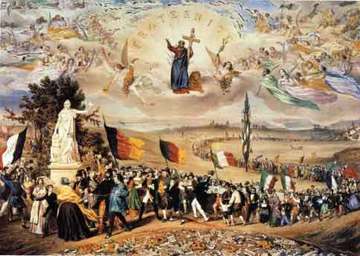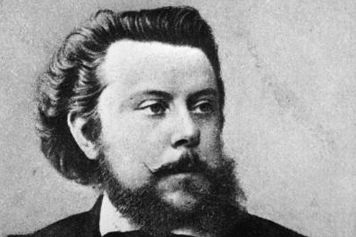Art & Architecture:
After the French Revolution and Napoleonic Wars, artists throughout Europe increasingly turned their attention to defining national identities. Although art and culture had performed this task prior to Napoleon, the events of the late eighteenth and early nineteenth centuries provided a point for a renewed attention to nationalism in the arts. Russia was a part of this cultural trend, and particularly after 1812, Russian cultural figures began to depict ideas about "being Russian". These definitions were varied in nature, but all sought to depict what made Russia unique. The attempt to articulate Russian nationalism provided a dominant theme of these diverse products, and the figures who addressed it include a who's who of Russian artistic giants: Pushkin, Repin, and Mussorgsky are just a few of the names associated with Russian nationalism in the arts.
Geography
The geography of where nationalism and democracy spread was a large factor. As France began the Napoleonic War the countries they conquered saw the power of nationalism and thus the countries in close geographical proximity to France were the first to also be introduced to this idea of nationalism.
Military
The obvious effect that nationalism had is the French revolution and military was the way for them to spread this idea.
After the French Revolution and Napoleonic Wars, artists throughout Europe increasingly turned their attention to defining national identities. Although art and culture had performed this task prior to Napoleon, the events of the late eighteenth and early nineteenth centuries provided a point for a renewed attention to nationalism in the arts. Russia was a part of this cultural trend, and particularly after 1812, Russian cultural figures began to depict ideas about "being Russian". These definitions were varied in nature, but all sought to depict what made Russia unique. The attempt to articulate Russian nationalism provided a dominant theme of these diverse products, and the figures who addressed it include a who's who of Russian artistic giants: Pushkin, Repin, and Mussorgsky are just a few of the names associated with Russian nationalism in the arts.
Geography
The geography of where nationalism and democracy spread was a large factor. As France began the Napoleonic War the countries they conquered saw the power of nationalism and thus the countries in close geographical proximity to France were the first to also be introduced to this idea of nationalism.
Military
The obvious effect that nationalism had is the French revolution and military was the way for them to spread this idea.
Social:
The main starter in the nationalist movements across Europe was the French Revolution. In fact, it was during which that the term ‘nation’ was first used, and La Marseillaise, which was written during the period was the first national anthem of any state. It was also after this that state holidays started to be popular. During the Revolution itself, military victories abroad created a sense of national pride that had not been experienced before. France’s Declaration of the Rights of Man, 1789 states, “The principle of all sovereignty resides essentially in the nation. No body or individual may exercise any authority which does not proceed directly from the nation.” This is firm evidence of the birth of modern Nationalism in the shape of the French Revolution. The fact that a large amount of the population were in the army created a sense of comradeship and a sense that everyone was literally fighting for a common goal. French armies continued into Holland, Belgium, Switzerland in the last decade of the 18th century, therefore spreading the idea of nationalism to foreign countries which also included Germany and Spain
Political:
In some cases Nationalism took the form of regions seeking independence from the country they were currently part of. In others bigger countries formed out of smaller states with what they saw as a common identity. The common ground between the two was that they felt they belonged with people of the same ancestry to themselves, either in terms of. The days of multi-national empires were drawing to a close.
Economy:
In the America's Nationalists, as were the early Americans during the Revolution, sought for national unity during the crisis, wanting America do be identified as a separate country, and not affiliated with Britain. They wanted to be economically independent, not have taxes placed on them by the British from across the ocean. Nationalists desired to truly own the territory that they felt was part of their country, and for it not to be under British control. Nationalism is the pride of the nation to act as a whole, and to be separated from England's control.The idea of Nationalism started slowly, and in small groups. Pioneers of the thought included the early groups of rebels against the British rule, such as the members of the Sons of Liberty. The four most famous and well known of these members were Sam Adams, John Hancock, Patrick Henry, and Joseph Warren.
The main starter in the nationalist movements across Europe was the French Revolution. In fact, it was during which that the term ‘nation’ was first used, and La Marseillaise, which was written during the period was the first national anthem of any state. It was also after this that state holidays started to be popular. During the Revolution itself, military victories abroad created a sense of national pride that had not been experienced before. France’s Declaration of the Rights of Man, 1789 states, “The principle of all sovereignty resides essentially in the nation. No body or individual may exercise any authority which does not proceed directly from the nation.” This is firm evidence of the birth of modern Nationalism in the shape of the French Revolution. The fact that a large amount of the population were in the army created a sense of comradeship and a sense that everyone was literally fighting for a common goal. French armies continued into Holland, Belgium, Switzerland in the last decade of the 18th century, therefore spreading the idea of nationalism to foreign countries which also included Germany and Spain
Political:
In some cases Nationalism took the form of regions seeking independence from the country they were currently part of. In others bigger countries formed out of smaller states with what they saw as a common identity. The common ground between the two was that they felt they belonged with people of the same ancestry to themselves, either in terms of. The days of multi-national empires were drawing to a close.
Economy:
In the America's Nationalists, as were the early Americans during the Revolution, sought for national unity during the crisis, wanting America do be identified as a separate country, and not affiliated with Britain. They wanted to be economically independent, not have taxes placed on them by the British from across the ocean. Nationalists desired to truly own the territory that they felt was part of their country, and for it not to be under British control. Nationalism is the pride of the nation to act as a whole, and to be separated from England's control.The idea of Nationalism started slowly, and in small groups. Pioneers of the thought included the early groups of rebels against the British rule, such as the members of the Sons of Liberty. The four most famous and well known of these members were Sam Adams, John Hancock, Patrick Henry, and Joseph Warren.
Works Cited
http://www.history.com/topics/french-revolution
http://www.victorianweb.org/history/hist7.html
http://www.foreignaffairs.com/articles/136906/lloyd-s-kramer/nationalism-in-europe-and-america-politics-cultures-and-identiti
http://www.jstor.org/discover/10.2307/1405683?uid=3739728&uid=2129&uid=2&uid=70&uid=4&uid=3739256&sid=21101946739101
http://www.jstor.org/discover/10.2307/211483?uid=3739728&uid=2129&uid=2&uid=70&uid=4&uid=3739256&sid=21101946739101
http://www.diplomatie.gouv.fr/en/france/institutions-and-politics/the-symbols-of-the-republic/article/the-declaration-of-the-rights-of
http://www.victorianweb.org/history/hist7.html
http://www.foreignaffairs.com/articles/136906/lloyd-s-kramer/nationalism-in-europe-and-america-politics-cultures-and-identiti
http://www.jstor.org/discover/10.2307/1405683?uid=3739728&uid=2129&uid=2&uid=70&uid=4&uid=3739256&sid=21101946739101
http://www.jstor.org/discover/10.2307/211483?uid=3739728&uid=2129&uid=2&uid=70&uid=4&uid=3739256&sid=21101946739101
http://www.diplomatie.gouv.fr/en/france/institutions-and-politics/the-symbols-of-the-republic/article/the-declaration-of-the-rights-of


